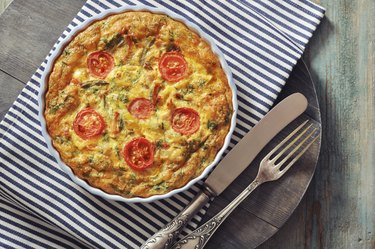
Athletes and those looking to add lean muscle mass need more protein than the average person, and experts say getting it through your diet is better than loading up on supplements. Get the scoop on the best foods to get 200 grams of protein a day, to keep your energy high and to increase strength.
Tip
Aim to eat 30 to 45 grams of protein at each meal, along with a protein-rich snack before bed, to increase muscle mass and improve strength gains.
Video of the Day
Protein Requirements Per Day
Do you need 200g protein a day? Harvard Health Publishing says that the minimum amount of protein you should eat a day, or the Recommended Dietary Allowance (RDA), is 0.8 grams of protein per kilogram of body weight.
For a quick reference, multiply your weight in pounds by 0.36. If you weigh 150 pounds, for example, that would be 54 grams of protein, which is obviously way less than a 200g protein diet. The RDA is just the very minimum you should be eating to not get sick, and depending on your goals and activity level, you will likely need more protein.
Video of the Day
According to The Academy of Nutrition and Dietetics, athletes, bodybuilders or those looking to add lean muscle mass need much more protein than this. It recommends that athletes should get 1.2 to 2.0 grams of protein per kilogram of body weight each day. This would mean that if you weigh 220 pounds and are active, then a 200g protein diet is right for you. Most athletes, and those weighing under 220 pounds, won't need to follow a 200g protein diet; however, keep in mind you will still need more than the RDA.
How Much Protein Per Meal?
It is important to space out the amount of protein you eat at each meal, for maximum benefit, and a study pinpointed exactly how much is best if you are looking to build muscle. A December 2016 article in Clinical Nutrition found that meals with between 30 and 45 grams of protein, eaten several times a day, provide the ideal amount associated with increasing or maintaining lean body mass.
Do you like to snack to night? As it turns out, that may not be a bad thing, if your snack is high in protein. A June 2015 article in the Journal of Nutrition found that men who ate 27.5 grams of protein before bed had increased muscle mass, and improved strength gains, when compared to those who didn't. If you want a late snack, make sure it is a high-protein snack, like beef jerky or a creamy berry quinoa parfait.
Read more: Healthy High Protein Desserts
Foods with High Protein
Whether you are following a 200g protein diet or need far less than that, the foods listed below are full of nutritious protein. According to the Mayo Clinic, getting your protein from food is better than getting it from supplements, and, contrary to what you might think, you don't need to load up on steak at every meal, as there are several ways to get in your protein goals.
The following are protein-packed foods, with nutrition amounts listed, according to the USDA National Nutrient Database:
- 3 ounces of trout, tuna or salmon: 21 grams of protein
- 3-ounce serving of beef: 22 grams of protein
- 3 ounces of chicken: 19 grams of protein
- 3 ounces of turkey: 24 grams
- 1 ounce of beef jerky: 13 grams
- 1 ounce of pumpkin seeds: 6 grams
- 1 cup of cottage cheese: 27 grams of protein
- 1 egg: 6 grams
- ¼ cup of almonds: 7 grams
- 1 cup of cooked beans: 16 grams
- 1 tablespoon of peanut butter: 7 grams
- 1 cup of cooked lentils: 18 grams
- 1 cup of broccoli: 3 grams
- 1 cup of quinoa: 8 grams
- 15-ounce container of nonfat Greek Yogurt: 12 grams
- 1 cup of edamame beans: 14 grams
- 1 cup of coconut milk: 5 grams
- 1 cup of low fat milk: 8 grams
- Blueberry protein muffins: 20 grams
- Spinach and feta avocado toast on keto bread: 13 grams
- Peanut butter protein pancakes: 21 grams
You can also get to your 200g protein goal with a nutrient-packed smoothie. Add protein-rich ingredients like Greek yogurt, peanut butter, almond butter and coconut milk, and sip on this drink as a meal replacement or snack.
Whether you are trying to eat 200g protein a day, or are just trying to increase your protein intake, ditch the supplements and keep yourself fueled with a combination of protein-rich lean meats, fish, nuts, dairy and vegetables to help build and maintain lean muscle mass.
- Harvard Health: "How much protein do you need every day?"
- The Academy of Nutrition and Dietetics: "Protein and the Athlete — How Much Do You Need?"
- Clinical Nutrition: "Per meal dose and frequency of protein consumption is associated with lean mass and muscle performance"
- Journal of Nutrition: "Protein Ingestion before Sleep Increases Muscle Mass and Strength Gains during Prolonged Resistance-Type Exercise Training in Healthy Young Men"
- Mayo Clinic: "Are you getting too much protein?"
- USDA National Nutrient Database: "USDA Food Composition Databases"